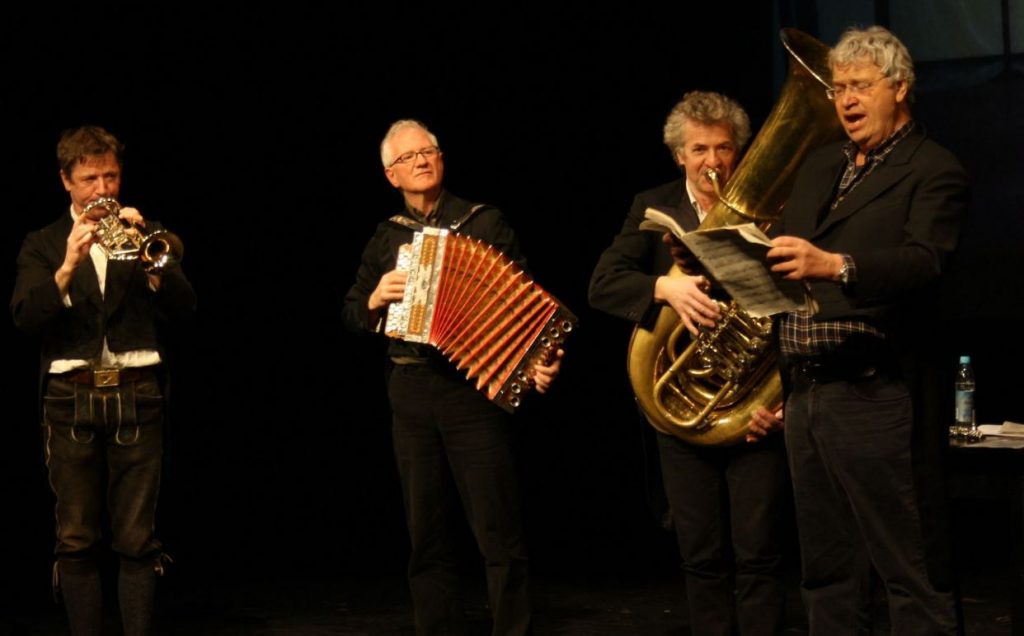
SSNIPpets (37): Home Office
Carnival is over, we were still allowed to go outside the door in the Rhineland then. In the meantime, everything has moved to home office. Now, what happens if you are no longer allowed to see your local bookstore since you may bump into someone coming home from a conference in China? Before you run out of stock of reading material, Rupprecht Podszun has hoarded news and written down what was still on his mind for 2019 and 19a. Here are his SSNIPpets: small but significant news, pleasantries and information – our pet project!
German competition act reform – state of play
Future doctoral students are always happy to find lots of material (as are readers forced into home office). This week, two volumes worth reading were added to the reading list for those who analyse the amendment of the German competition act. Firstly, the Bundeskartellamt has issued a statement on the plans of the Ministry of Economics. As an act in itself this is, let’s say, unusual, because the Bundeskartellamt is, after all, an enforcement authority. But on the other hand: Where – except perhaps in Düsseldorf – are there so many experienced cartel lawyers as at Kaiser-Friedrich-Straße 16 in Bonn? Perhaps in Villemombler Straße 76 – there, in Duisdorf, the 3rd and 9th Decision Division of the NCA are temporarily (?) located. They reside in the former Gallwitz Barracks, which became the seat of the Federal Ministry of Economics in 1949.
Yes, children, at the time when the landlord in the Gallwitz Barracks, Ludwig Erhard, brought prosperity to Germany, Bonn was the capital of the West German Federal Republic and the seat of the Federal Government. The Bundeskartellamt, on the other hand, was based at Tempelhof Airport in Berlin, which went down in history not only because of the Bundeskartellamt’s headquarters, but also because of the “candy bombers” that landed there. Let me explain: During the Soviet blockade of West Berlin in 1948/49, the city could not be reached by land or water, and our friends from the United States sent planes to ensure supplies – the airlift. They landed mainly in Tempelhof, but also dropped small parcels over the city to the cheers of the Berlin brats. I have to think of such transport routes, because if Berlin were to be sealed off again, e.g. because of a rampant virus, the Airlift would have to be reactivated and care packages would have to be dropped over Kreuzberg if necessary (contents: Club Mate, vegan celery schnitzel, chia seeds).

Back to the statement of the enforcers: Not only does an executive body comment on a legislative project here, it is even (mildly) critical of some provisions, even though they were drafted by its own supervisory authority. Wow, this is true independence!
The other statement is much thicker, it is also a little less political than the one of the apolitical Bundeskartellamt: The Studienvereinigung Kartellrecht, the legendary German Antitrust Bar Association (GABA, not GAFA) has issued three volumes with its comments on abuse law, fining/ECNplus implementation and merger control/damage claims/reforms of the administrative procedure. If you do not want to read it now, I most humbly refer you to the doctoral theses available in three or four years.
New Kids on the Blog
Those not into reading doctoral theses (incomprehensible!) can also listen to news on the antitrust amendment: Stephan Manuel Nagel, a partner with Taylor Wessing, has launched the “Competition Cast”, the first German-language antitrust law podcast. In episodes 1 and 2, between 20 and 25 minutes long, just right when you cycle from Villemombler Straße to Kaiser-Friedrich-Straße, the moderator discusses Section 19a of the draft bill, the regulatory style abuse control for GAFAs, with Nagel and his guest Thilo Klein from Compass Lexecon. Nagel considers the provision to be superfluous, Klein does not. That is wonderful. More to come!

PS: I’ve just learned that Justus Haucap, our Düsseldorf Chief Economist, is also in a podcast – Bert Losse from Wirtschaftswoche, a German business magazine, interviewed him for “Chefgespräch” (nothing to do with cooking) and asks him about the techlash and the question whether it is time to divest Google. Hope you are able understand German…
The US DoJ at work
A new
player in lobbying is apparently the Antitrust Division of the Department of
Justice in the USA. Under Makan Delrahim (or rather under You know who Donald
Trump) the division has massively increased its amicus curiae interventions. As
in Germany, the antitrust authority can intervene in private litigation on
antitrust matters – in our country this is regulated in Section 90 of the
German Act against Restraints of Competition (ARC) (and since the 9th amendment
to the ARC, it is also possible in disputes on unfair practices, not just
antitrust). In Germany, the Bundeskartellamt intervened in 20 cases in 2017 and
2018. As far as I know, these cases are typically those heard in the top level
courts, where the Bundeskartellamt’s witty Chief Litigator Jörg Nothdurft is
known to be a welcome guest.
I guess it was similar in the United States. But: The Justice Department has taken the stand as an amicus more frequently in 2019 than the Obama administration had in eight years. Apparently, intervention is already taking place in lower courts. According to the Financial Times the opinions issued in the new Amicus Curiae Programme have clear lines of approach:
„The result has been a flurry of legal briefs that have pushed patent holder-friendly positions, undercut lawsuits brought by other enforcement agencies and placed the justice department on the side of Mr Delrahim’s former lobbying client, Qualcomm, the chipmaker.”
David Cicilline, who heads the relevant subcommittee in the US House of Representatives, already protested in May last year.
For me, this story shows two things: How good it is to have independent antitrust authorities and how good it is to have good judges who can resist the insinuations, if necessary from their own expertise.
Rail Cartel II
Hot off the press, I have just received the ruling of the German Federal Court of Justice (Bundesgerichtshof) on the Rail Cartel II (Case KZR 24/17). The PDF still smells of printer’s ink. But perhaps it is also the ink from blackening personal details… It is too early for an evaluation of the content of this damages case in private enforcement, especially since the cartel senate’s composition of the judgement was different from that of the Rail Cartel I case, which caused quite a stir. At issue was a ruling by the Jena Higher Regional Court (Case No. 2 U 583/15), in which Thüringerwaldbahn was affected. The Bundesgerichtshof overturned the Jena Court and referred the case back. In Jena, the obligation to pay damages had been established on the merits (not yet regarding the specific amount of damages). The Bundesgerichtshof gives details on how to apply the prima facie assumption of evidence regarding the damage.
What is noteworthy though is what we call the “sailing instruction” at the end of the judgment. This is usually a small part where the higher court referring back to the lower one gives some guidance how to deal with the case when it now comes to second hearing. As I recall, this is usually roughly on the same level as the “sailing instruction”, given in Homer’s Odyssey by witch-goddess Circe on how to navigate between the six-headed monster Scylla and the whirlpool Charybdis:
“‘But the other cliff, thou wilt note, Odysseus, is lower—they are close to each other; thou couldst even shoot an arrow across—and on it is a great fig tree with rich foliage, but beneath this divine Charybdis sucks down the black water. Thrice a day she belches it forth, and thrice she sucks it down terribly. Mayest thou not be there when she sucks it down, for no one could save thee from ruin, no, not the Earth-shaker. Nay, draw very close to Scylla’s cliff, and drive thy ship past quickly; for it is better far to mourn six comrades in thy ship than all together.’”
That is short and gripping (here in the translation by A.T. Murray). The Bundesgerichtshof goes a little bit further and obviously really wants to make sure that the lower court gets it right now: The “sailing instruction” is about 10 pages long. Ship ahoy!
What’s important in life again?
It was hard to catch a breath in 2020 and to reconsider what happened last year. Yet, luckily this review of the past year had already been undertaken by the personalities in our Antitrust Advent Calendar who did an excellent job. My team (who have been instrumental in this work) and I are still very proud of this collection of top-class antitrust lawyers of the younger generation plus four experienced legends, namely Deborah P. Majoras, Christopher Bellamy, Wang Xiaoye and Eleanor Fox. In this context, the sentence of an older colleague of mine came to mind again, who once said: As a scientist (and probably in any profession) there are the “formative years”, and the ideas, personalities and ways of working that you take up during these years – at the beginning of your career – will accompany you for the rest of your life. “Lucky you”, he laughed, “if you have been exposed to a good idea at that age that will carry you for 40 years!”
Oh, another
idea for from 2019: CoRe Blog’s Friso Bostoen nominated the books you should have read in 2019. The good thing with this
paper stuff: It’s still there!
Bloody business
I actually wanted to add from 2019 what had been left over. For example this: I have a soft spot for antitrust law in the blood transfusion sector and I wrote the seminal (and actually only) paper on that in German: ZWeR 2008, 193. I am interested in this topic because I dealt with it during my time at the Bundeskartellamt, and because I always find it interesting to look at the places where competition does not come to full bloom. This is often the case in the non-profit sector. Now, unfortunately this is necessary, I would like to make this clear right away: Non-profit organisations do a great job, they are very important etc.

Now the “but”: The more well-known non-profit organisations in Germany are often also entrepreneurs, i.e. they offer goods and services on the market. Take blood donation as an example: In Germany, donating blood is heavily regulated. It is generally forbidden to pay people for donating blood (exceptions apply). This means that private companies in the field have difficulties getting that most important input, namely human blood, while one non-profit organisations, arguing from a moral high-ground, is very succesful in motivating people to donate voluntarily and without a significant compensation. Yet, in the next step things turn completely commercial: Blood is processed to blood products, these are sold to hospitals and others. Now, guess how highly concentrated that market is thanks to the excellent position on the blood donations “market”. The charitable organisation (or rather its entrepreneurial part that is of course exempted from the usual taxation etc.) has a quasi-monopolistic position. I find there is a certain gap between the image evoked with blood donors and the business manners on the downstream market. It tastes a bit like the lemon squirt in a Bloody Mary.
Now, last year there was a discussion about the supply of blood plasma, which seems to be insufficient in supplies. Or is it? In an answer to a question in Parliament, the German government did not see any cause for concern. The Süddeutsche Zeitung wrote in its issue on 7.10.2019 that the price of blood plasma products (“liquid gold”) had risen by 30% last year alone.
Merger Control for Hospitals
At the Bundeskartellamt at the time, we examined the merger of blood donation services and the centralisation of laboratories processing blood. I instantly understood when looking into the sector that there may be productive efficiencies if blood banks merge. Yet I also understood that it is problematic for reasons of security of supply: If there is a case of contamination supply will collapse completely if the one and only lab has to close down. Just mentioning this in times of viruses and of discussions in Germany how to regulate merger control for hospitals.
Auditing the auditors
Another market that is highly concentrated (but far from non-profit) is that of auditors. In a dossier with the headline “Connect 4”, the Süddeutsche Zeitung examined the market power of the Big Four accountants. That was in February 2019 (Come on, Podszun, enough of coming to terms with the past! – Yes indeed, just this one more!)
All companies listed in the German DAX, according to the newspaper at the time, are audited by KPMG (53 %), Pricewaterhouse Coopers (30 %), Ernst & Young (13,3 %) and Deloitte (3 %). The newspaper concludes its report on the oligopoly of big accountants by quoting the Big Four as “too few to fail”. If they were regulated or even broken up, there would be no one who could take over their essential task, namely providing the essential services and controls to companies.
I do not subscribe to that “too few to fail” vocabulary, btw. There are many companies in corporate heaven who thought they were irreplaceable.
The news, now
A quick look at 2020: The Bundeskartellamt’s first official act this year was to impose a fine of 154 million € on wholesalers of plant protection products for price agreements which ran between 1998 and 2015. Andreas Mundt is quoted in the press release as saying:
„Especially during the first few years, some companies simply used the agreed price list to set their own prices and basically just added their respective company logo to the final list.“
That’s just efficient and saves you paying for helping hands in forming the cartel! Among the fined companies is the Bavarian BayWa, a monument of Bavaria, founded in 1923 as „Bayerische Warenvermittlung landwirtschaftlicher Genossenschaften AG“. The agricultural trading company was (or is?) a powerhouse in Bavarian agriculture and politics, and it is not the first time that a breath of scandal is in the air. Every cartel is scandalous, of course. But this case is peculiar: BayWa is largely owned by cooperatives of farmers in Bavaria and others in the business, all on that level of cooperative (“Genossenschaft”), a particular German form of entrepreneurial organisation with a lot of solidarity and lovey-dovey involved. Now, if the trader sells pesticides at a higher price this hits primarily farmers – essentially, that is a rip-off of your comrades and owners.

I picked BayWa from the list of cartelists for another reason. It gives me the opportunity to post a video of a real classic: Biermösl Blosn, another Bavarian institution, an alternative music band that served as the antipope to the long-time ruling CSU/BayWa/FC Bayern-complex in Bavarian, once caused a stir with a very own version of the Bavarian anthem. Instead of “Gott mit dir, du Land der Bayern” they rhymed “Gott mit dir, du Land der BayWa ”. (May the Lord be with you, Land of Baywa).
Biermösl Blosn wrote this little song in 1979, and when the text was printed in a textbook for 8th grade school, the Bavarian Ministry of Culture had the edition destroyed. Today the song would go viral with such publicity. The asocial media, they might have their good points.
Have a nice weekend!
One thought on “SSNIPpets (37): Home Office”